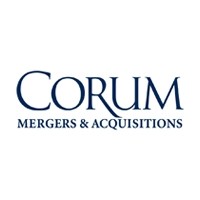The Importance of Performing Due Diligence on Prospective Buyers
In 2015, Corum represented eMOBUS, a leading provider of Mobility Managed Services (MMS), in their sale to global investment firm Marlin Equity Partners. Marlin then merged eMOBUS with one of its portfolio companies, Asentinel, a leading provider of lifecycle Technology and Telecom Expense Management (TEM) solutions. Corum recently sat down with the two co-founders of eMOBUS, Moe Arnaiz and Mathieu Guilmineau, to talk about their experiences.
Thinking about the sale, Arnaiz, who was the company CEO and President, recalled the importance of performing due diligence on their prospective buyers. "We actually did it twice. We were in due diligence with one public company, but they had an issue with their stock or earnings call, and had to put things on hold. Then we ended up selling to a private equity firm that was a very close number two on the opportunity." This was an intense period when Arnaiz says he was married to the office. But it was well worth it. Assisted by a Corum team led by Senior Vice President Rob Schram, the time investment ended in a successful sale to Marlin.
A key takeway for Arnaiz was clarity. eMOBUS’s first suitor actually made a higher offer than Marlin. However, they weren't clear on where eMOBUS would fit in their plans, what their next moves were, and how the deal would get done. By comparison, Marlin outlined a clear path that enabled the deal to proceed quickly. Thinking back, Arnaiz stressed the value of looking at the whole picture when assessing a potential buyer, “There's more than just a dollar value in a deal.”
For Guilmineau, it was the aftermath of the sale that stood out. As eMOBUS CTO, he was an important part of the transition of eMOBUS into Asentinel. "The piece that was the most interesting and intriguing for me was getting both cultures aligned. Doing things the same way, looking at things and prioritizing things the same way, getting a common way of proceeding and organizing, required a lot of communication. Communication was so critical at all levels for everybody, every component of both companies to move forward."
Training was a big part of that communication effort. Guilmineau said, “When you get enough people trained, it gives you the comfort to just step back and then move on. You have the confidence that everything will continue running as expected and continue to grow." That is exactly what happened, but Guilmineau noted that the transition took longer than expected, about 18 months.
After the transition, Arnaiz and Guilmineau took time off with their families to rest and reinvigorate. Guilmineau took his family to Maui. “We just decided to be there, the three of us, my wife and my son, and just do the exact opposite of our lifestyle here‒- just relax and not have any plan for the day.” Arnaiz and family went to Disneyland, perhaps less exotic than Maui, but fun.
But the two former tech executives realized they needed a longer-term break. Both took the greater part of two years off. During this time, Guilmineau learned to scuba dive and enjoy world class coral reefs. He also sharpened his software skills on personal projects. Arnaiz said he became a full-time family man, fitting in some part-time investing and advising, and took the time to “smell the roses."
Eventually, Arnaiz and Guilmineau were ready for their next foray into tech. That was a company they co-founded called Weeldi, an innovator in web-based process automation.
Arnaiz recalled that the hiatus afforded him time to sort things out. "Suddenly you start feeling like you need a purpose, and you need to do something with your energy. So Mathieu and I were in contact and we just kept the dialogue going. We cycled through different ideas, and eventually landed on Weeldi. I think we were both anxious and excited to get back at it.”
Weeldi is a small company with seven employees, something Arnaiz and Guilmineau see as a distinct advantage. “The goal is to try to keep it as small as long as we can. I think our last company was just under 30 people when we sold it, and probably a little bigger than we'd even like to be here. But one of our agreements when we founded the company was that neither of us wants to manage huge teams. A lot of revenue and a lot of customers are great, but we want to manage for scale early.”
Having been entrepreneurial partners with Arnaiz for many years, Guilmineau reflected on what drove their success. "The obvious thing that comes to mind is having the right partnership. You need someone like Moe, who has good insight on what the market wants and can find the customers, the opportunities, and describe the vision; and then someone like me, who can actually execute on it." Arnaz put it more succinctly, "We always knew we wanted to work together.”
